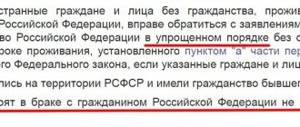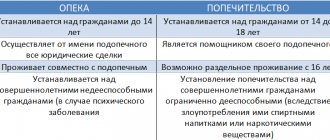Dual citizenship in Russia: allowed or prohibited?
Dual citizenship (bipatrism) is a situation when a person is recognized as a citizen of several states at once. While in the Russian Federation, such a citizen can present both a local passport and a passport of another country.
A binational citizen is free to decide where to serve and pay taxes. But only one state will pay state payments, such as pensions and benefits.
Theoretically, dual citizenship in the classical sense is allowed in Russia. This right is specified in the main state document - the Constitution, namely in the sixty-second article. But if you read paragraph 1 of this article, it becomes clear that bipatrism in Russia is possible only with those countries with which an international agreement .
Excerpt from the Constitution
Now let's see which states we have ever had such agreements with. There are only two of them.
- The first is Turkmenistan . But the agreement giving the right to obtain dual citizenship with this republic ceased to apply in 2015. Moreover, the initiator was the Republic of Turkmenistan.
- The second is Tajikistan . For 2021, the agreement with the republic is valid. Therefore, a Russian with a Tajik passport is recognized as a binational citizen .
There is dual citizenship between Tajikistan and Russia.
This is where the list ends. Russia did not conclude any other agreements. It turns out that today only holders of passports of the Russian Federation and Tajikistan can have in Russia what in legal language is called dual citizenship.
When entering the Russian Federation, such a person can show either of his two passports: Russian or passport of the Republic of Tajikistan. And he must be allowed through any of these identification documents. When contacting government agencies of the Russian Federation, a Russian-Tajik citizen can also use any of the passports.
We wrote about what Russia’s agreement on dual citizenship with Tajikistan provides in a separate article. Here we note the main thing: a bipatriate will be able to receive a pension, benefits and other government benefits only in one country - in the one where he has a permanent residence permit. Therefore, for the sake of double payments, obtaining dual citizenship does not make sense. But you will only have to serve once - in the state where the citizen permanently resides at the time of conscription.
How to obtain dual citizenship with the Russian Federation for a foreign citizen
Only citizens of Tajikistan have the right to obtain dual citizenship with the Russian Federation due to the existence of an International Agreement with this state.
Rights of citizens of Tajikistan who have been granted Russian citizenship:
- visa-free entry and exit from the Russian Federation;
- preferential conditions regarding registration and long stay;
- protection of both states;
- social benefits of both countries.
The procedure for obtaining a Russian passport does not differ from the procedure provided for citizens of other states. A general and simplified procedure is provided. The only difference is that citizens of Tajikistan, when acquiring Russian status, do not renounce their previous citizenship.
Conditions for migrants from Tajikistan to receive Russian citizenship:
- reside in the Russian Federation with a residence permit for at least 5 years before submitting an application for Russian status, if there are no grounds for simplified acquisition of citizenship;
- comply with the Constitution and Legislation of Russia;
- have a legal source of funds to live and support themselves and their family if the applicant has moved with his family.
Can a Russian have a second citizenship if there is no international treaty?
A Russian can be a citizen of several countries , that is, have a second, third, etc. citizenship. But if the Russian Federation does not have an agreement with another state, then in Russia this will not be recognized as dual citizenship. second citizenship is applied to such a situation .
Accordingly, if you have passports of the Russian Federation and any other country (except Tajikistan), then this will be a second , not dual citizenship.
A Russian who wants to obtain citizenship of another state is not obliged to part with his Russian passport. The laws do not require this.
“The acquisition by a citizen of the Russian Federation of another citizenship does not entail the termination of citizenship of the Russian Federation,”
— Article 6 of Federal Law-62 “On Citizenship of the Russian Federation.
But at the same time, the law specifies that if a citizen of the Russian Federation has become a citizen of another country, then for Russia he remains only a Russian . A passport of another state on the territory of the Russian Federation will not be taken into account.
A Russian who has several citizenships is recognized in the Russian Federation only as a citizen of the Russian Federation, excerpt from Article 6 of the Federal Law “On Citizenship of the Russian Federation”
Therefore, Russians who have acquired one or more passports from other countries (except Tajikistan):
- when entering the Russian Federation, they show a Russian passport;
- any documents in Russia are issued using a Russian passport;
- When contacting government agencies, they also act exclusively as Russians and present a Russian identity document.
Russian legislation is also friendly to foreign citizens who wish to join the ranks of Russians.
Future citizens of the country are not forced to renounce their original citizenship (previously they were, but since July 24, 2020, Russian passports began to be issued without renouncing other citizenship). Therefore, when a foreigner becomes a citizen of the Russian Federation, he retains his previous citizenship (if his native state allows its subjects to have several passports).
About the difference between dual and second citizenship
Consequences of late submission of notification to the Ministry of Internal Affairs
If a Russian does not meet the deadlines for submitting a notification provided for by the law of the Russian Federation, or does not provide all the information that should be contained in the application, he will have to pay an administrative fine (the fine amount is 500-1000 rubles). Deliberate concealment of a passport of another state is subject to a large fine, up to and including criminal liability.
Valid reasons for late submission of an application include: health status (if there is an appropriate medical certificate), work under a contract (a copy of the contract is required), etc. Other actions can be considered as unwillingness to appear at the authorized body to submit a notification.
Thus, Russia does not recognize foreign citizenship of its residents: a Russian has the right to stay on the territory of the Russian Federation, enter and exit the country, and apply to government agencies only using his Russian passport. At the same time, he can use the second passport in other countries.
When receiving a second citizenship, a Russian is obliged to personally notify the Ministry of Internal Affairs about this within 60 days from the date of receipt of the relevant document. If he was outside the Russian Federation during this period, the period will be counted from the moment of his entry into the territory of his country. Failure to comply with the deadline for filing an application will result in a fine, including criminal liability.
Watch the video: necessary documents confirming the fact of notification of second citizenship.
If a Russian has passports from 2 countries, he fulfills his obligations only to the state in whose territory he permanently resides. However, before applying for documents from a foreign country, it is worth thoroughly studying the legislative framework of that country in order to avoid legal difficulties and undesirable consequences.
Which countries allow dual citizenship with Russia: list
Below is a list of countries with dual citizenship with Russia. Since states that recognize official dual citizenship can be counted on the fingers of one hand, the list includes countries in which citizens are allowed to have two or more passports , but not dual citizenship. That is, each state considers such a person only as its citizen.
European countries with dual citizenship with Russia
- Austria (allowed in exceptional cases) - 99% of citizens receiving Austrian citizenship are forced to renounce their previous one. The Austrian authorities do not object to dual citizenship only in the case where a child of country citizens was born in another state and received another citizenship (for example, in the USA, where citizenship is given by birth). Dual citizenship is also possible if a person is given an Austrian passport for special merits.
- Albania - The Albanian Citizenship Law does not prohibit having two citizenships. Article 9, which lists the conditions for candidates wishing to acquire a country's passport, does not require renunciation of previous citizenship. Therefore, citizens of the state can have several passports and not fear any punishment.
- Belarus - Belarusians can easily obtain citizenship of other countries - they will not be deprived of their native citizenship because of this.
- Belgium - until 2008, the Belgian authorities were harsh on issues of multiple citizenship and automatically deprived the passports of their subjects who changed countries. Since April 28, 2008, the position has changed in the opposite direction - citizens of the state can now easily receive passports from other countries and remain Belgian. Foreigners can apply for a Belgian passport without renouncing their original nationality.
- Bulgaria (with exceptions allowed) - a citizen of Bulgaria, when receiving a passport from another country, will not lose his original citizenship. If a Russian wants to obtain a Bulgarian passport, then, according to Article 12 of the Law on Bulgarian Citizenship, he needs to renounce his original citizenship. But there are many exceptions in which you can keep your native passport. This is possible by obtaining Bulgarian citizenship by: Bulgarian origin; a parent who is a citizen of Bulgaria; investments; marriage to a Bulgarian; special services to the country.
- Britain - the British authorities have no problems with citizens having multiple citizenships. Russians are accepted into the ranks of English citizens without having to give up their Russian passport.
- Hungary - Hungary will accept new citizens without requiring them to renounce their previous citizenship. Hungarians also do not have to notify about having another citizenship.
- Germany (allowed in some cases) - Germany has a negative attitude towards multiple citizenship. Dual citizenship with Germany is possible in some cases, in particular, if a foreigner cannot formalize the renunciation of his citizenship for reasons beyond his control, or if he risks losing a large sum of money if he refuses his native passport. There are also exceptions for some older applicants (all exceptions are in paragraph 12 of the German nationality law).
- Greece
- Denmark - Denmark has long required candidates wishing to join the Danish ranks to renounce their citizenship. But since September 2015, the kingdom has allowed its subjects to have two or more passports.
- Ireland
- Iceland
- Spain (legally prohibited, but in fact possible) - The law of Spain seems to require Russians who want to become Spaniards to renounce Russian citizenship, but in fact this procedure means nothing. The whole process boils down to the fact that the newly-minted Spaniard informs the court that he renounces his previous citizenship and signs the corresponding document. For the Russian authorities, such a document is just a piece of paper that has no legal force. Therefore, it turns out that the citizen has fulfilled the requirements of Spain and does not lose his Russian passport. But Spain doesn’t need to know about this, so when entering the country at the border you should show your Spanish passport.
- Italy
- Kosovo
- Lithuania
- Luxembourg - For a long time, Luxembourg resisted the idea of its subjects having two passports. But in 2009, the country's government gave in and allowed migrants to retain their previous citizenship if they received a Luxembourg passport.
- North Macedonia
- Malta - newly-minted Maltese have been allowed to retain their previous citizenship since 2000.
- Moldova (by law it is not possible, by law it is possible) - The sixth article of the Law on Citizenship of the Republic of Moldova states that Moldovans can have dual citizenship only in exceptional cases, and the 15th article states that when receiving Moldovan citizenship one must renounce the previous one. In fact, Moldovans can have two, three or more passports, which they actively use.
- Netherlands (allowed in exceptional cases) - The Netherlands requires new citizens of the country to renounce their native citizenship. You can only keep a Russian passport in certain cases: if you are married to a citizen of the country or are in an official partnership with a Dutchman; you have a refugee residence permit; you were born and live in the Netherlands; you risk losing a large amount of money if you renounce citizenship, for example, you lose the right to inheritance; if refusal requires paying an unaffordable amount.
- Norway - Norwegian citizens are allowed to have two or more passports from 2021 after changes to local citizenship law come into force.
- Poland
- Portugal
- Romania
- Serbia
- Slovenia (allowed in some cases) - Slovenian citizenship is obtained in two ways: by descent (when ancestors lived in the country) and through naturalization (by living in Slovenia for 10 years or if there are other reasons). In the first case, the applicant is not asked to renounce his original citizenship. And in the second case, Russians, like people from other countries, will have to say goodbye to their original citizenship.
- Ukraine (legally it’s not possible, but in fact it’s possible) - the laws of Ukraine do not allow you to receive a blue passport without renouncing your previous citizenship. And Ukrainians who defect to other countries are promised to be deprived of their native citizenship. But in reality these requirements do not work. Ukrainians - both ordinary residents of the country and government officials - are now en masse receiving citizenship of other countries and no one is depriving them of their native citizenship.
- Finland - Finnish authorities changed their stance on multiple citizenship in 2003 and allowed new citizens not to give up their first passport.
- France
- Croatia (allowed in exceptional cases) - a Russian who decides to permanently change the Russian Federation to Croatia will have to refuse a red passport. Croatian laws allow you to retain your previous citizenship if the applicant has a Croatian spouse, or if the candidate is an ethnic Croat and can prove it.
- Montenegro (allowed in exceptional cases) - Montenegro does not allow its citizens to have two or more citizenships. An exception is made only for wealthy foreigners who become Montenegrins through investment. To obtain such a privilege, the candidate will have to fork over half a million euros.
- Czech Republic - since 2013, Russians receiving Czech citizenship can have two passports in their pocket and nothing will happen to them for it.
- Switzerland
- Sweden
About ways to obtain dual citizenship
Despite the fact that full-fledged dual citizenship for a Russian is possible only with Tajikistan, many residents of the Russian Federation have passports of other states, being in the status of multiple citizenship. Practice shows that even if the laws of a country prohibit having two citizenships, most often there are exceptions that allow you to circumvent such prohibitions.
Kazakhstan
The Republic of Kazakhstan is one of the states that prohibit its citizens from having another citizenship and require foreigners applying for Kazakh citizenship to revoke the previous one. With these measures, the country's authorities have designated a priority direction of domestic policy aimed at employment and social protection of their own citizens. When accepting citizenship of another country, a Kazakh citizen must inform the immigration authorities of the Republic of Kazakhstan about this and terminate Kazakh citizenship . A foreigner, including a Russian, obtaining citizenship of the Republic of Kazakhstan, may retain his previous citizenship if he:
- has not reached the age of majority;
- is incapacitated;
- has particularly distinguished himself before the Kazakh state or is a specialist in dire need of the country’s economy. The decision to grant citizenship in this case is made by the President of the country and, in addition to the applicant, members of his family also receive citizenship;
- is a repatriate or a descendant of one.
Dual citizenship is prohibited in Kazakhstan
Belarus
Belarusian legislation also does not provide for dual citizenship: you need to leave the previous one in order to get a Belarusian one, or give up a Belarusian passport in favor of another state. An exception is made only for minor children in mixed marriages. Before turning 18, these children can have two citizenships, but after reaching adulthood they must choose one of them.
The Russian side views the acquisition of Russian citizenship by a Belarusian citizen as a special case of the general rule: after fulfilling all the requirements for an applicant, such an applicant can receive a Russian passport and will have the status of a Russian citizen on the territory of the Russian Federation.
Children under the age of majority can have dual citizenship in Belarus
Azerbaijan
Azerbaijanis who obtained it before 1998 can legally have a second citizenship, i.e., until the Decree of the President of the country was issued, according to which it is prohibited to own passports of two or more countries in Azerbaijan. If a citizen of a country has accepted the citizenship of another state, he must inform the Azerbaijani authorities about this within a month, after which the Azerbaijani citizenship of this person will lose force . If you do not inform in a timely manner about acquiring another citizenship, you may receive an administrative fine.
Recent changes in the immigration legislation of the Republic of Azerbaijan have tightened the requirements for applicants for obtaining citizenship of the country: for example, a child born on the territory of Azerbaijan can be granted citizenship of the country only if both parents (or one of them) are citizens of the Republic of Azerbaijan or persons without citizenship; children of foreign citizens in such a situation are not entitled to Azerbaijani citizenship. In addition, Azerbaijan can be deprived of citizenship for serving in the army of another state or for acts that undermine the foundations of the country’s national security.
The laws of Azerbaijan do not provide for dual citizenship
Moldova
The attitude towards dual citizenship in Moldova is more loyal than in other countries of the former USSR. Despite the fact that the republic has not signed an agreement on dual citizenship with any country in the world, having two passports in Moldova is not prohibited for anyone, even civil servants. Restrictions on two citizenships for officials and politicians were introduced in 2007, but they were abolished in 2009, and today it is possible to have multiple citizenship, even holding the highest position in the country. Russians can safely apply for Moldovan citizenship without giving up Russian citizenship. To do this, you will need to confirm that the applicant has reached the age of majority and meets one of the requirements:
- lived in Moldova for 10 years or more;
- has been married to a citizen of the country for at least 3 years;
- has refugee status in Moldova.
An applicant for Moldovan citizenship must:
- have a permanent income in the country and be able to support themselves without turning to the state for social assistance;
- know the Moldovan language at a level sufficient for communication at work, at home and in public places.
The attitude towards dual citizenship in Moldova is more loyal than in other countries of the former USSR
Countries in America that allow dual citizenship
North America:
- Antigua and Barbuda , a small island state in the Caribbean with a population similar to Moscow’s Bibirevo, will welcome new citizens and will not demand to say goodbye to their native citizenship. Antigua and Barbuda is one of those countries where you can buy a passport for investment. The investment amount is 100 thousand dollars.
- The Bahamas (possibly in exceptional cases) - it is legal to have dual citizenship: only children who were born in another state and received citizenship there automatically can have Bahamian and some other citizenship. But even then, after turning 21, you will need to decide and choose one country.
- Barbados
- Belize
- Bermuda
- Grenada - the list of documents for Grenada citizenship does not include renunciation of previous citizenship. You can become an islander, including through investment, and the entire registration process can take place without coming to Grenada - ready-made passports are simply sent to wealthy applicants home.
- Dominica , a small island state that is often confused with the Dominican Republic, provides citizenship without renouncing the previous one. Investors who receive a Dominica passport for investment do not even have to come to the country - everything can be done in absentia and receive a new passport by mail.
- Dominican Republic
- Canada - Canadian authorities, like Russian ones, make absolutely no difference whether their subjects have passports from other countries or not. Therefore, Russians who have arrived in large numbers do not have to worry about their original citizenship—it will not be taken away when they receive a Canadian passport.
- Costa Rica not only recognizes multiple citizenship, but also gives citizenship to any child born in the country. Russian emigrants, by the way, willingly go here to give birth: medicine for pregnant women in the country is not bad, and the child, along with citizenship, will have the opportunity to travel to 130 countries in the future.
- Cuba
- Mexico
- Saint Kitts and Nevis
- Saint Lucia
- USA
- Jamaica
South America:
- Argentina - The Argentine government does not mind at all if the country's citizens have more than one passport. No one is punished or oppressed on this basis.
- Bolivia
- Brazil
- Venezuela
- Colombia
- Paraguay
- Peru
- Suriname - in this state you will be accepted without renouncing your citizenship, but will be asked to confirm that your home country is not against your decision to become a citizen of Suriname.
- Uruguay
- Chile
- Ecuador
Limiting Factors
Restrictions in the field of multiple citizenship are present and concern a certain circle of persons. Those who have foreign citizenship are prohibited from:
- enter the civil service (Federal Law No. 79 on civil service 2004/27/07 edition 2016/19/12 art. 16 clause 1 clause 7);
- establish, control and be an editor in the media, as well as own more than 20% of the shares (Law No. 2124-1 on the media 1991/27/12 edition 2016/03/07 art. 19.1);
- be part of the OPRF (Federal Law No. 32 on the Public Chamber 2005/04/04 edition 2016/28/12 art. 7 clause 2 clause 5).
The situation with the performance of military duty is not clear (Federal Law No. 53 1998/28/03, edition 2017/22/02):
- Persons with dual citizenship who have served in the army of another country are not subject to conscription in Russia (Article 23-g);
- those who have foreign citizenship are not subject to conscription (Article 2, paragraph 1);
- within the meaning of Article 23, persons with 2 citizenships are not exempt from military service.
Despite the fact that military service is associated with state secrets and is a type of civil service, in practice, all citizens of military age who have Russian citizenship, upon appearing on Russian territory, are immediately drafted into the ranks of the Armed Forces for a year (usually construction troops and the Ministry of Emergency Situations).
Holders of multiple citizenship cannot be elected (to the Duma, the Security Council, the Federation Council, etc.), be judges, work in the Prosecutor's Office and the Investigative Committee, serve or work in the Ministry of Internal Affairs and the FSB (Law No. 5485-1 on state secrets 1993/21/07; PP No. 1003 1998/22/08).
Is dual citizenship of Russia and Kazakhstan possible?
Kazakhstan is one of those states that are jealous of their citizens. The Republic does not allow its subjects to have either dual or second citizenship. Dual citizenship of Russia and Kazakhstan is currently impossible. It means that:
- a Kazakh citizen who applies for Russian citizenship will have to say goodbye to the citizenship of the republic. Paragraph 5 of Article 21 of the Law “On Citizenship of the Republic of Kazakhstan” states that Kazakhstanis who acquire another citizenship are deprived of their RK passports.
- A Russian who wants to join the ranks of citizens of Kazakhstan will have to renounce his Russian passport, in accordance with Article 17 of the Law “On Citizenship of the Republic of Kazakhstan.”
Article 21 of the above law states that after obtaining Russian citizenship, you need to hand over your Kazakhstan passport to the internal affairs bodies of the Republic of Kazakhstan or to the embassy. 30 days are given for this. If a Kazakh citizen decided to cheat - received another citizenship and at the same time continued to use the passport of the Republic of Kazakhstan, then he risks receiving a serious fine.
What is dual citizenship? How the legislation of the Russian Federation regulates the possibility of obtaining it
The reader can read about the procedure for obtaining citizenship in our feature article.
Dual (multiple) citizenship is a legal status that gives its holder citizenship of two or more states. At the same time, a bipatriate (a person with dual citizenship) simultaneously has the rights and responsibilities of each existing citizenship.
In accordance with Part 1 and Part 2 of Art. 62 of the Constitution of the Russian Federation, a Russian citizen has the right to accept dual citizenship, but the presence of a second citizenship does not exclude the possibility of enjoying Russian rights and performing the duties of a Russian citizen.
Despite the right of a resident to become a dual citizen, its implementation is possible only if there is an international agreement between the Russian Federation and the state whose citizenship the applicant plans to obtain. Art. 62 of the Constitution regulates the legal status of persons with dual citizenship; it specifies cases of acquiring citizenship without renouncing a Russian passport.
Dual citizenship of Russia and Belarus: formally prohibited, but you can have two passports
Officially, dual citizenship is prohibited in Belarus. President Lukashenko honestly admits that he is “afraid” to take such a measure.
“If we allow everyone (to have dual citizenship in the Republic of Belarus, editor’s note), then I’m afraid. I’m afraid that such a wave of dual citizenship will rush here,”
—
Alexander Lukashenko.
The President of the Republic sees no point in making an exception for fraternal Russia, since “the rights are almost the same here and there.”
Lukashenko on dual citizenship of Russia and Belarus
But, like Russia, Belarus does not prohibit having two citizenships. That is, if a citizen of the republic received a passport of Russia or any other state, then they will not deprive him of citizenship of the Republic of Belarus or punish him in any other way. It’s just that such a person for Belarus will be considered only a Belarusian. Second, third, etc. The country's authorities will not recognize citizenship of their subjects. This is directly stated in Article 11 of the Law “On Citizenship of the Republic of Belarus”.
“A person who is a citizen of the Republic of Belarus is not recognized as belonging to the citizenship of a foreign state, unless otherwise provided by international treaties of the Republic of Belarus,”
—
from Article 11 of the Law “On Citizenship of the Republic of Belarus”.
Russia, in turn, will consider such a citizen only a Russian.
In general, if you have passports from two countries, then on the territory of Russia you are a Russian, and on the territory of Belarus you are a Belarusian.
Penalty for dual citizenship
There is no penalty for dual citizenship, since there is no prohibition on dual citizenship. A fine is imposed for violating the deadline for submitting a notice or submitting an incomplete set of required papers. The fine ranges from 500 to 1000 rubles.
If notification of dual citizenship is not filed, criminal liability is provided in the form of a fine in the amount of up to 200,000 rubles, wages or other income received within 1 year, or compulsory work for up to 400 hours. The conditions and amount of the fine are established by Art. 19.8.3 Code of Administrative Offenses of the Russian Federation and Art. 330.2 of the Criminal Code of the Russian Federation.
Dual citizenship of Russia and Ukraine: is it possible to have passports of two states
It is formally impossible to have Ukrainian and Russian passports, but in practice it is possible. If you read Ukrainian laws, you get the impression that the local authorities are serious in this regard. For example, Article 2 of the Law “On Citizenship of Ukraine” states that if a Ukrainian has received a passport of another country, then for his native state he will remain only a Ukrainian.
Everything is according to the same law, namely, according to its 19th article, if a citizen of the country receives another passport, then he will be automatically deprived of Ukrainian citizenship.
In reality the situation is different. Ukrainian passports are not taken away from Ukrainians who en masse acquire citizenship of the Russian Federation and other countries. Local authorities simply turn a blind eye to this. Moreover, even if a person would be glad to lose his citizenship in Nezalezhnaya, he will not be allowed to do so. In recent years, the Ukrainian authorities have practically not signed documents for renunciation of citizenship.
Therefore, to the question of whether it is possible to have citizenship of Ukraine and Russia, the answer is affirmative. A Ukrainian who becomes the owner of a red passport becomes a Russian for Russia, but remains a Ukrainian for Ukraine. They will not fine him or punish him in any other way for joining the ranks of the Russians.
But if a Russian wants to become a Ukrainian, he will still need to give up his Russian passport.
In what cases can a Russian citizen obtain second citizenship?
From the point of view of our legislation, a Russian is free to acquire another citizenship at any time he wishes. Of course, to do this, you need to fulfill a number of requirements imposed by foreign regulations.
However, we must not forget about the restrictions of Russian law, which allow the presence of several passports, with the exception of the cases described above. Therefore, if you are not and do not plan to be in the civil service, the issue of obtaining a second citizenship is a purely personal desire and opportunity.
How to get a second citizenship
There is no single recipe here. The process can be quite lengthy and exhausting: almost no state will immediately grant citizenship to a foreigner.
As a rule, the path to a second passport is thorny: before obtaining the status of a citizen in the chosen country, you will need to live there for several years, then apply for a residence permit (hereinafter referred to as residence permit) and only after that you can apply for citizenship.
It is worth carefully studying the requirements of local legislation: it happens that acquiring citizenship of another country is possible only if you leave the Russian one.
Notification
If a citizen of the Russian Federation has acquired citizenship of another country, he is required by law to notify the migration authorities about this. The divisions of the Main Directorate for Migration Issues of the Ministry of Internal Affairs of the Russian Federation (hereinafter referred to as the Main Directorate for Migration Issues of the Ministry of Internal Affairs of the Russian Federation) act as such. This measure was introduced in order to strengthen migration control and protect state interests.
Which countries are the most popular?
When we intend to go on vacation, we choose a country or city depending on our preferences. We enjoy our vacation for a week or two, then return home to our usual surroundings. It’s a different matter if we are talking about global changes and moving to another state. Here you should think carefully about which country to choose, evaluate all possible options, and compare them with your desires and capabilities.
As a rule, our compatriots give preference to the USA, European countries (Spain, Italy, Great Britain, Germany), and Australia.
At the same time, many are confident that in all other countries the attitude towards dual and second citizenship is as tolerant as in Russia. However, this is far from true: in some countries there is a legal ban on a second passport. Therefore, before making a final decision, it is better to clarify in advance which countries have dual citizenship. The concept of “dual” is not used by chance: most official documents refer to both classic dual and multiple citizenship as such.
Dual citizenship of Russia and Armenia
The Armenian authorities are more than loyal in matters of dual citizenship. In 2007, the government updated the Law “On Citizenship of the Republic of Armenia” and added a separate article (13.1) dedicated to dual citizenship. If you read it, it turns out that citizens of Armenia can freely receive passports from other countries. Local authorities will not interfere, but Armenians who move to foreign lands will continue to be considered only their citizens.
The same law specifically talks about renunciation of citizenship. If an Armenian has prepared such a refusal, then he will not lose citizenship of the republic on this basis. Therefore, all Armenians who, when receiving Russian citizenship, renounced RA citizenship (it was required until July 24, 2021) retained the status of citizens of Armenia.
By the way, previously the law stated that an Armenian must report that he has received another citizenship. But in 2021, local authorities gave up on this requirement. The then deputy chief of the Armenian police, Vardan Yeghiazaryan, complained to journalists that no one complies with the norm, and during the entire period one person filed a notification about another citizenship; as a result, they decided to remove this provision from the law.
List of countries that prohibit dual citizenship
Migration policy is not as loyal everywhere as in Russia; there are regions where the Government is against dual citizenship or a second passport. Various reasons are given: they do not want to lose national characteristics, welfare, they are afraid because of the immigration outflow. In general, each of these countries has something to lose, but only in the opinion of local authorities. The form of government often also influences - dual citizenship was never allowed under monarchy and socialism.
In 2021, there is still no law allowing one to become a second or dual citizen in the following countries:
- South Korea
- North Korea
- Japan
- China
- Hong Kong
- Macau
- Thailand
- Cambodia
- Vietnam
- Indonesia
- India
- Kazakhstan
- Ukraine
- Belarus
- Austria
- Sweden
- Germany
- Denmark
- Azerbaijan
- UAE
- Kuwait
- Qatar
In principle, Russia actively cooperates with these countries, but unfortunately, it is almost impossible to acquire dual citizenship from them due to the domestic ban. There are some exceptions when the authorities are interested in attracting a Russian scientist or artist.
Dual citizenship of Russia and Germany
Germany does not want to share its citizens with other countries, so it does not allow them to have any citizenship other than German. The country's authorities expressed their attitude towards dual citizenship in the German Citizenship Law (StAG).
The 17th paragraph of the document states that German citizenship will be taken away from a German if he receives a passport from another state. And paragraph 10 says: if a foreigner decides to get a German passport, then he will have to renounce his native citizenship.
True, there are several exceptions in which the German authorities are ready to sacrifice principles and allow the applicant to retain his original citizenship. According to paragraph 12 of the law mentioned above, this is possible in the following cases:
- For some reason, a person cannot formalize renunciation of citizenship. This happens if the country’s authorities prohibit the procedure for renunciation in principle. For example, some Arab and African countries do not release citizenship. There are also situations when the law seems to have a procedure for renunciation, but in fact it is impossible to renounce citizenship, for example, the candidate is delayed and all sorts of obstacles are put in place. In this case, Germany is ready to meet halfway and allow you to retain your native citizenship.
- If the applicant has citizenship of one of the EU countries or Switzerland, then he will be given a German passport and at the same time will be allowed to retain citizenship.
- If a person risks suffering large financial losses if he loses his previous citizenship, then he can also be given a German passport without exit. For example, a candidate received an inheritance, but if he renounces his citizenship, he will lose the right to it. As lawyers explain, dual citizenship with Germany on this basis is possible when large sums of at least 10 thousand euros are involved.
- For some people over 60 years of age, an exception may also be made if obtaining an exit is too difficult for them. For example, a pensioner is required to be present in person to formalize the refusal, but due to illness he cannot travel to his home state and undergo the procedure.
As you can see, there are not many exceptions and in most cases it is impossible to have dual citizenship of Russia and Germany.
Cases in which Germany allows dual citizenship
Obtaining foreign citizenship
But traveling your whole life, leading a semi-vagrant lifestyle, is not an option for the faint of heart. You always want to have something of your own, some kind of native place where you will always be welcome.
There are certain advantages to being a go-getter everywhere, but this lifestyle borders too closely on loneliness.
If for some reason the living conditions in your home country are not satisfactory, you can think about “settling down” in more comfortable conditions. But here you can encounter a number of problems
:
- Obtaining citizenship in another country can take many years.
- To achieve the coveted “crust” you will have to learn the language, become familiar with the history and culture of the country to which you migrated.
- The investment option for obtaining citizenship will cost no less than a hundred thousand dollars. With such funds you can live relatively well in Russia.
- Even after 5 years of living in a foreign land, they may refuse to issue a local passport; no one gives a guarantee.
- Sooner or later you will have to return home, at least to visit family and close friends. Well, or longing will wake up for your native expanses. How will Russian border guards and police officers react to a foreign passport?
Dual citizenship of Russia and Moldova
The Moldovan government allows its subjects to have two or more citizenships. But with the caveat that for the republic such a person remains only a citizen of Moldova.
“A citizen of the Republic of Moldova who has citizenship of another state, in relations with the Republic of Moldova acts only as its citizen,”
—
from Article 24 of the Law “On Citizenship of the Republic of Moldova”.
The same article says that Moldovans can receive passports from other countries - because of this, they will not be deprived of the citizenship of the republic.
It turns out that a Moldovan who has received a Russian passport (and vice versa) can use two passports. But for the Russian Federation he will only be a Russian, and for Moldova - only a Moldovan.
What is the difference between dual and second citizenship
There are two types of multiple citizenship: dual and second. Countries with which a special agreement has been concluded can have dual citizenship. Russia only has such an agreement with Tajikistan. When a Russian citizen acquires Tajik citizenship, he receives dual citizenship.
A Russian with dual citizenship retains full rights and responsibilities in both countries, but pays taxes and performs military service in the country of permanent residence.
In other cases, citizenship will be second. For example, when a Russian acquires an Israeli passport, he receives a second citizenship. In addition, in this case, in Russia he will be considered only as a Russian, and in Israel - as a citizen of this country. And he may be required to serve in the army in both countries if he is not removed from military registration in one of them in time.
In the case of taxes, it is not second citizenship that plays a role, but residence. If a person is outside the Russian Federation for more than 183 days within 12 consecutive months, he becomes a tax non-resident and pays personal income tax at a rate of 30% instead of 13%. If you received income in Russia, but do not live there for more than 183 calendar days a year, you pay 30% of your income.
Dual citizenship of Russia and the USA
The US government does not care at all whether its citizens have any citizenship other than American or not. As we found out above, the Russian authorities look at this issue in exactly the same way, so it is possible to have Russian and US citizenship at the same time .
A Russian who wants to become an American will not have to renounce his native citizenship - neither Russian nor American laws require this. But it is worth considering that for the American government, the second, third, tenth passports of US citizens are just meaningless pieces of paper, since in the eyes of the country's authorities their citizens are only American, and no one else's, subjects.
Should a former foreigner submit a notification after receiving Russian citizenship?
And this is where the real confusion occurs. In general, according to the law (Article 6 of Federal Law-62 “On Citizenship of the Russian Federation”), only Russian citizens who, already being Russians, receive another citizenship, .
If a foreigner makes a Russian passport, then after that he is not required to submit a notification that he already has another citizenship.
Example 1: Nastya is a citizen of the Russian Federation. In 2021, she became a Canadian citizen. By law, Nastya is required to notify Russian authorities of her Canadian citizenship.
Example 2: Victoria is a citizen of Ukraine. In 2020, she also received a Russian passport. By law, Victoria is not required to give notice of a second citizenship.
Example 3: Victor is a citizen of Belarus. In 2015, he received Russian citizenship. In 2021, he obtained French citizenship. Victor is not obliged to notify about Belarusian citizenship, but must report French citizenship, since he received it after he became a Russian citizen.
But in some regions, former foreigners who have received Russian citizenship, contrary to the law, are required to be notified of their original citizenship. Otherwise, they face fines.
“I received a passport in St. Petersburg and they said that after you complete the registration, they will notify you about the acquisition of a second citizenship,”
—
message from VK.
“My mother was threatened with a fine because she was late in notifying me of her other citizenship.
And she notified in the end. It happened not so long ago, this year,” from discussions in the VK group.
“Apparently the Krasnodar region lives its own life and is forced to notify within a month,”
—
from discussions in the VK group.
Therefore, until the inspectors come to a consensus, it is better to play it safe and, after purchasing a Russian passport, notify that you already have another citizenship.
Summarize:
- If you are a Russian citizen and then receive citizenship of another country, 100% notification is required.
- If a foreigner has acquired Russian citizenship, then notification is not required by law, but in fact in some regions they are required.
Is it possible to submit a notification of second citizenship through State Services?
To date, filing a notification of second citizenship through State Services is not provided. The law offers only two options: through the Ministry of Internal Affairs or mail.
How to submit a notification?
The procedure is described in detail in Article 6 of Federal Law-62 “On Citizenship of the Russian Federation” and in Order of the Ministry of Internal Affairs No. 994 “On approval of the procedure...”.
Deadlines for filing notification (Part 3 of Article 6 of Federal Law-62):
- 60 days after receiving citizenship of another country - if you are in Russia;
- 30 days after entering the Russian Federation - if you live abroad;
Where to send the notification (part 5 of article 6 of Federal Law-62):
- to the department of the Ministry of Internal Affairs at the place of registration. If there is no permanent registration in the Russian Federation, then at the place of temporary registration. If there is no registration at all, then with the Ministry of Internal Affairs at the place of actual location;
- by mail.
What documents are needed (part 7 of article 6 of Federal Law-62):
- a copy of a foreign passport;
- copy of Russian passport;
- a copy of the child's birth certificate - if the parent submits a notification for a minor.
Where to get the notification form for second citizenship
The form should be (but this is not always the case) at the Ministry of Internal Affairs office or at the post office. You can fill it out there right away.
According to paragraph 5 of Order of the Ministry of Internal Affairs No. 994, data can be entered into the form by hand or on a computer. Do not leave empty fields. Errors, corrections, abbreviations, abbreviations are not allowed. Print the form on A4 sheet.
How to submit notification of second citizenship
Everything is done quite simply and quickly:
- come to the post office or the Ministry of Internal Affairs;
- hand over the completed form and documents to the employee;
- a specialist checks the data;
- a postal employee or the Ministry of Internal Affairs fills out the detachable part of the notification, puts his signature and department seal on it;
- The tear-off spine is handed to the applicant. It needs to be preserved.
Why does another citizenship remain after receiving a Russian passport?
UPD: renouncing citizenship to obtain Russian citizenship is not required from 07/24/2020. The information below is no longer relevant.
- GCitizenship
Legislative framework of the Russian Federation
This material is dedicated to those who already hold a Russian passport (therefore, we are not considering ways to obtain it) and are thinking about obtaining a similar document in another country. As soon as such a thought is born in your head, the next one should immediately appear: does a citizen of the Russian Federation have the right to have dual citizenship? Therefore, when it comes to rights, you need to turn to competent sources - legislative acts.
The main documents regulating issues of citizenship in general and dual citizenship in particular are:
- Constitution of the Russian Federation;
- Federal Law of May 31, 2002 No. 62-FZ “On Citizenship of the Russian Federation”;
- international treaties.
Bipatrism
This concept came to us from Roman law. As it turned out, the Romans knew how not only to fight and destroy: creative activity was not alien to them. From the point of view of their legislation, bipatrism is the simultaneous presence of citizenship of two different states. The holder of these citizenships himself was called a binational.
History does not stand still, the era of desperate warriors is a thing of the past, but their laws formed the basis of the legal systems of many states. Over time, new terms appeared, and old ones often acquired a different meaning.
Now bipatrism is a situation when a person has more than two passports.
Such a concept as, for example, triple citizenship does not apply: having three, four, five or more passports are all examples of multiple citizenship.
Its distinctive feature is that each state will see in a person only its citizen. This means that you will have to fulfill your civic duty - serving in the army, paying taxes and the like - in all countries.
There is also such a thing as dual citizenship. The main condition here is a signed agreement between the two countries. With such a document, someone who has two passports can choose which country to give their civic debt to. In addition, both states consider a person as an equal citizen.
Even if a person has two passports, but there is no agreement between the countries, this is multiple, not dual citizenship.
Many of our compatriots decide to take a very bold step - change their place of residence, and special attention is attracted not by neighboring cities or regions of our Motherland, but by other countries. However, staying there on a bird's license is a very dubious pleasure, but obtaining local citizenship greatly increases the chances of a decent life.
But then a kind of dilemma arises: I want to get an overseas passport, but I don’t really want to lose a Russian one. In this regard, the natural question is whether it is possible to have two or three citizenships in Russia, because no one will undertake to vouch for the success of the “I want to live abroad” operation. There is always the possibility that you will have to pack your bags again and move in the opposite direction, even if you are the proud owner of a passport from another country.
The very question of allowing one to have several different passports causes a lot of controversy, and each state solves it in its own way. Let's talk about what the Russian authorities think about this, whether second citizenship is allowed for a Russian citizen or not.
Is dual citizenship prohibited in Russia?
This question will be answered by the legislative acts that we discussed earlier. Art. 62 of the Constitution of the Russian Federation and Art. 6 of the Law “On Citizenship of the Russian Federation” make it clear: a citizen of the Russian Federation can have citizenship of a foreign state. But his duties to the state will depend on the existence of agreements with other countries.
If there are no such agreements, the person is considered only as a citizen of the Russian Federation with all the ensuing consequences, rights and obligations. And it doesn’t matter at all how many other passports a person has in his closet: all the rights, freedoms and obligations of a citizen of the Russian Federation, without exception, apply to him.
If international agreements exist, all issues of citizenship are regulated by their provisions.
International agreements of the Russian Federation on dual citizenship
We found out that Russia does not prohibit obtaining a passport from another country and is equally loyal to both second and dual citizenship. But it’s one thing to treat, it’s quite another to actually conclude agreements with other states. Let's look at whether there are countries with which Russia has an agreement on dual citizenship.
Over the entire period, only three such documents were signed. The first agreement is the Treaty of Friendship, Cooperation and Mutual Security between the Russian Federation and the Republic of Armenia dated December 29, 1991. Its text stated that the parties would sign a separate agreement that would cover dual citizenship. However, this did not happen, and today the original agreement itself is not in force.
The second state with which agreements were reached was Turkmenistan, and on December 23, 1993, an Agreement on the settlement of issues of dual citizenship was signed. Its initial term was five years, with automatic renewal unless one of the parties expressed a desire to terminate the agreement. But in 2021, the Turkmen side expressed such a desire, Moscow accepted it, and on May 18, 2021, the agreement terminated.
The third agreement, which successfully exists and is in force to this day, is the Agreement between the Russian Federation and the Republic of Tajikistan on the settlement of issues of dual citizenship, signed on September 7, 1995. In accordance with it, countries recognize that a person is a citizen of both and cannot simultaneously exercise the rights and obligations that are provided for by both legislation. A person who has citizenship of both states fulfills duties and is also endowed with rights and freedoms in accordance with the regulations of the party in whose territory he permanently resides. In fact, dual citizenship of Russia and Turkmenistan in 2021 is the only example of such a controversial phenomenon in its classical and correct sense.
Legal restrictions
Having several passports and feeling like you belong in different countries is, of course, wonderful. However, this freedom is offset by some restrictions. One of them concerns voting rights. Russians who have passports of other states and are located outside the Russian Federation cannot hold positions as members of election commissions if such positions provide for the right to cast a decisive vote.
Civil service
Those who have the citizenship of another state or even states cannot be accepted into public service. This is stated in Article 16 of the Federal Law of July 27, 2004 No. 79-FZ “On the Civil Service of the Russian Federation”. True, it also contains a clause: if an international treaty states otherwise, priority is given to the content of such an agreement.
What is meant by dual citizenship?
What is dual citizenship?
From a legal point of view, the concept of dual citizenship is considered as the legal connection of a citizen with two states.
Based on this connection, certain rights and obligations arise with each of the states in which the citizen has citizenship.
Recognition of dual citizenship must be mutual and considered equal.
Citizens can use social security in the country in which they permanently reside.
Persons with dual citizenship can count on protection and patronage in each of their states.
Legislation
Russian
Based on the Constitution of Russia, having Russian citizenship means enjoying all rights and freedoms, as well as fulfilling the duties specified in the legislation of the Russian Federation.
Interstate agreements
According to Art. 23 of the Constitution of the Russian Federation, citizens have the right to receive dual or triple citizenship. At the same time, as written in paragraph 2 of this article, a person who has received citizenship of a foreign state retains the rights and obligations determined by the presence of Russian citizenship.
Many people are concerned about whether it is possible to have dual citizenship in Russia. Obtaining dual citizenship is possible if this country has an appropriate agreement with Russia.
Legal conflicts of the new law
The new Federal Law of June 4, 2014 No. 142-FZ amended the Decree “On Citizenship” of May 31, 2002 No. 62-FZ.
The following changes have been made: a person who, along with Russian citizenship, has citizenship of another country, has a certain connection with the other country in which he is a member. As a result, he has responsibilities not only to Russia, but also to another country.
This factor reduces a citizen’s patriotism and his attachment to Russia. When making decisions related to Russia, a citizen of another country will be guided not only by the interests of the Russian Federation, but also by the interests of the state in which he also holds citizenship.
Therefore, the state has the right to know which of its citizens is guarding not only Russian interests, but also foreign ones, having passports of other countries. However, the legislation does not establish restrictions for Russian citizens to have citizenship of another country.
In what cases is it prohibited?
Russian law prohibits certain categories of citizens from having second citizenship.
These include:
- persons who enter the public service, unless this is provided for by international treaties;
- founders or members of the media;
- media editorial staff;
- founders of more than 20% of the shares of the media;
- employees of organizations that carry out broadcasting;
- members of the Public Chamber;
- members of election commissions with decisive voting rights.
What Russian laws say about bipatrism
But before deciding which country to choose for yourself as a second homeland, it is important to find out how the state treats all this, does Russia recognize dual citizenship? Wouldn't this be a violation of domestic legislation?
Dual citizenship
As for dual citizenship, everything is simple. The government of our state has at its disposal one such agreement. Now Russians can freely apply for citizenship of the country that is the second party to the agreement. There are no restrictions in this situation. From this we can conclude that to the question of whether dual citizenship is allowed in Russia or not, the answer is unequivocal - “yes”, but only with those states that are signatories of special international documents. Art. speaks about this. 62 of the Constitution of the Russian Federation and the Treaty between the Russian Federation and the Republic of Tajikistan on the settlement of issues of dual citizenship, signed on September 7, 1995.
But what about those who have not signed any agreements with Russia? In this case, there is no direct indication that Russians are prohibited from obtaining passports of other countries. This means that they can legalize their status in any other country in the world, if this does not contradict its laws, but at the same time they must fulfill several requirements established by the Russian government. They will be discussed below.
There are quite a lot of territories and countries in the world that recognize the dual identity of their citizens. Moreover, they strongly encourage such actions in exchange for investments, the acquisition of real estate, including the sale of their passport for a certain amount of money. Multiple citizenship also exists in Russia, but here it is necessary to list some of the nuances associated with it.
Before deciding to obtain a passport from another state, it would not hurt to find out all the information about the responsibilities that await you on the other side of the border:
- the need to serve in the army;
- risk of double taxes;
- other obligations under the Constitution.
These conditions are not typical for dual citizenship.
Arguing about what dual citizenship is in Russia, we can add that it is possession of identity cards of the Russian Federation and another country with which there are certain types of agreements in the field of migration legislation, fixed by agreement.
Triple citizenship
To denote the multiple citizenship of its citizens, Russia uses the term “dual citizenship”, but at the same time allows that a candidate can have legal status in three powers at once.
It is again possible to talk about which countries with which triple citizenship is allowed in Russia, again only in the light of international agreements that the Russian government has signed and which confirm that the signatories recognize the citizenship of their residents and do not oblige them to renounce their first affiliation when joining a second one. .
The answer to the question “Is it possible to have three citizenships in Russia and if so, then with which countries?” is positive; only a small clarification is required: it is allowed, but only within the framework of signed agreements.
Second passport
The second citizenship of a Russian (if, of course, he has one) implies that he has legalized his position on the territory of a state with which we have not signed any agreements. In this case, it would be logical to assume that the other party recognizes this state of affairs, since it did not demand that the applicant renounce his Russian passport.
Accepting a second citizenship does not entail any negative measures on the part of the state, but do not forget that since neither party will recognize the citizenship of another state, each of them will demand the fulfillment of the obligations imposed on their wards.
Can Russians simultaneously have a passport of the Russian Federation and another state?
So, we have found out that a citizen of the Russian Federation has the right to dual citizenship, but whether such actions on the part of Russians are always acceptable, it is necessary to understand in a little more detail.
As mentioned earlier, Russians may well become owners of both dual and second affiliation. Permission for dual citizenship in the Russian Federation is given by the corresponding interstate treaties, but you can obtain a second citizenship only if the laws of the second state do not require you to renounce your previous passport. The difference between the two statuses will only be that dual affiliation is not denied by either side and gives the owner the right to enjoy the advantages of both powers.
It is also necessary to know: despite the fact that Russian legislation does not clearly state whether staying in a second civil status is allowed in Russia, the law still clearly defines: a citizen of the Russian Federation will be considered exclusively Russian.
In turn, the country of second citizenship will consider such a person as its subject, requiring him to fulfill all the duties assigned to him.
When is dual ownership possible?
We found out whether it is possible to have dual citizenship in Russia. It is worth noting that not all states are ready to provide foreign candidates with such an advantage. It is possible to have a passport of another country, but in this case citizenship will be called “second” and will not receive recognition on Russian territory. Moreover, persons who wish to become Russians will be required to renounce their previous citizenship. Russia is not alone in this issue; the same demand is put forward by a large number of countries, for example:
- Malta;
- Croatia;
- Estonia;
- Poland;
- China;
- Germany;
- Japan;
- South Korea;
- India and others.
But in light of the rapid globalization of the planet, a considerable number of countries allow foreigners to obtain a passport of their state without giving up the previous one. So, as they say, look for options, and there really are options. But with regard to whether Russians can have dual citizenship, they have much less choice. Read more about this.
Which countries has Russia signed an agreement with?
In order to avoid misunderstandings and have a good understanding of whether obtaining the legal status of which country is within the scope of the law, you need to clarify the list, which includes countries that have dual citizenship with Russia.
Unfortunately, the list of powers with which this issue has been resolved is extremely small; today it includes only one state - the Republic of Tajikistan (since 1996). It is also worth noting the Republic of Abkhazia, with which Russia signed an Agreement on Friendship, Cooperation and Mutual Assistance, which is something different than the Agreement on Dual Citizenship of the Russian Federation with the Republic of Tajikistan, and therefore cannot be considered official. However, 90% of Abkhazians have Russian passports, which are recognized, however, only by Venezuela, Nicaragua and Nauru. This state of affairs can be considered, rather, a benefit from the Russian Federation to residents of the unrecognized republic than an official document.
Until 2021, dual citizenship of Russia and Turkmenistan, which was unilaterally denounced by Ashgabat, remained valid. Contrary to this, persons who were able to obtain dual status before the agreement was canceled still hold two passports.










